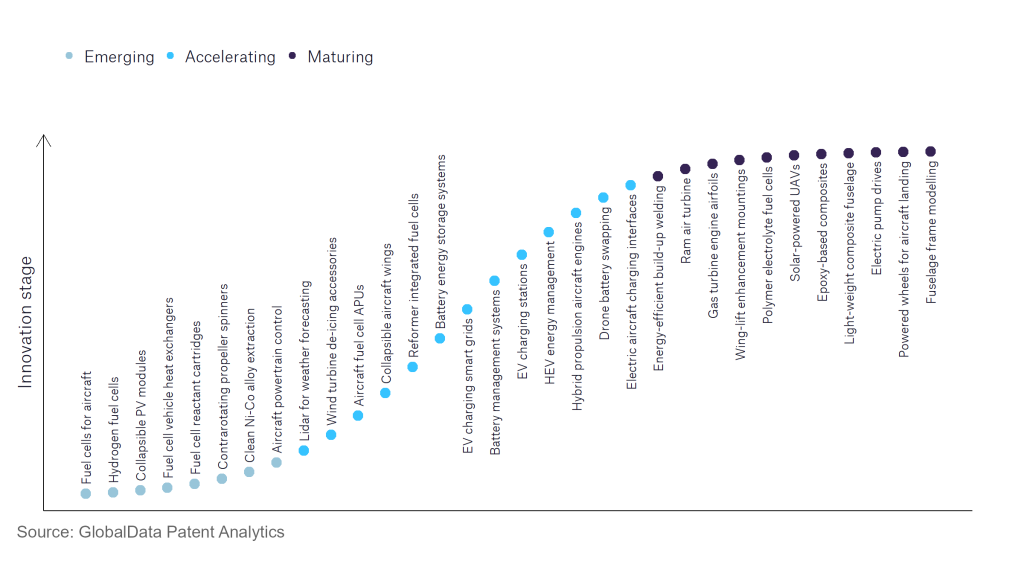The aerospace and defence industry continues to be a hotbed of innovation, with activity driven by the increasing capability and applicability of drones, coupled with falling costs, and growing importance of technologies such as quadcopters, drone modularisation, and high-altitude platform stations (HAPS). In the last three years alone, there have been over 174,000 patents filed and granted in the aerospace and defence industry, according to GlobalData’s report on Drones in Aerospace, Defence & Security: Electric aircraft power transmission system. Buy the report here.
However, not all innovations are equal and nor do they follow a constant upward trend. Instead, their evolution takes the form of an S-shaped curve that reflects their typical lifecycle from early emergence to accelerating adoption, before finally stabilising and reaching maturity.
Identifying where a particular innovation is on this journey, especially those that are in the emerging and accelerating stages, is essential for understanding their current level of adoption and the likely future trajectory and impact they will have.
180+ innovations will shape the aerospace and defence industry
According to GlobalData’s Technology Foresights, which plots the S-curve for the aerospace and defence industry using innovation intensity models built on over 262,000 patents, there are 180+ innovation areas that will shape the future of the industry.
Within the emerging innovation stage, hydrogen fuel cells, contrarotating propeller spinners, and fuel cells for aircrafts are disruptive technologies that are in the early stages of application and should be tracked closely. EV charging stations, collapsible aircraft wings and electric aircraft charging interfaces are some of the accelerating innovation areas, where adoption has been steadily increasing. Among maturing innovation areas are fuselage frame modelling and powered wheels for aircraft landing, which are now well established in the industry.
Innovation S-curve for environmental sustainability in the aerospace and defence industry

Electric aircraft power transmission system is a key innovation area in environmental sustainability
An electric aircraft power assembly allows power to be transmitted from batteries to the propulsive units. It is an essential component of all proposed electric aircraft systems.
GlobalData’s analysis also uncovers the companies at the forefront of each innovation area and assesses the potential reach and impact of their patenting activity across different applications and geographies. According to GlobalData, there are 10+ companies, spanning technology vendors, established aerospace and defence companies, and up-and-coming start-ups engaged in the development and application of electric aircraft power transmission system.
Key players in electric aircraft power transmission system – a disruptive innovation in the aerospace and defence industry
‘Application diversity’ measures the number of different applications identified for each relevant patent and broadly splits companies into either ‘niche’ or ‘diversified’ innovators.
‘Geographic reach’ refers to the number of different countries each relevant patent is registered in and reflects the breadth of geographic application intended, ranging from ‘global’ to ‘local’.
Patent volumes related to electric aircraft power transmission system
| Company | Total patents (2021 - 2023) | Premium intelligence on the world's largest companies |
| Rolls-Royce Holdings | 67 | Unlock Company Profile |
| Airbus | 67 | Unlock Company Profile |
| General Electric | 61 | Unlock Company Profile |
| Safran | 50 | Unlock Company Profile |
| Raytheon Technologies | 45 | Unlock Company Profile |
| Israel Aerospace Industries | 24 | Unlock Company Profile |
| Siemens | 20 | Unlock Company Profile |
| Textron | 17 | Unlock Company Profile |
| Leonardo | 17 | Unlock Company Profile |
| Wisk Aero | 15 | Unlock Company Profile |
| VoltAero | 12 | Unlock Company Profile |
| Embraer | 11 | Unlock Company Profile |
| SZ DJI Technology | 11 | Unlock Company Profile |
| Hankuk Carbon | 9 | Unlock Company Profile |
| LG Display | 6 | Unlock Company Profile |
| Boeing | 5 | Unlock Company Profile |
| Zhejiang Geely Holding Group | 5 | Unlock Company Profile |
| Lockheed Martin | 5 | Unlock Company Profile |
Source: GlobalData Patent Analytics
Amongst aerospace and defence companies, Rolls-Royce is the leading patent filer in electric aircraft power train transmission systems. The company has invested heavily in recent years in electric propulsion for aircraft. In 2018, the company received £70m of £343m of funding from the UK government to stimulate next-generation aerospace technology development in the UK. The money went towards the firm’s ACCEL programme, which sought to develop high-speed electric aircraft. In 2021, the Spirit of Innovation, an aircraft developed under the ACCEL programme, broke the speed record for electric aircraft. The firm is seeking to leverage lessons learned from the programme to deliver electric propulsion for commercial customers within the decade. In 2022, the company stated that it was targeting a 2025 rollout for a small 8-18 seat all-electric aircraft. Other key patent filers include Airbus and Safran.
In terms of application diversity, Wisk Aero holds the most widely applicable patents in electric aircraft power transmission systems. Israel Aerospace Industries came in second, and Lockheed Martin came in third. Regrading geographic reach, VoltAero held the top position, followed by Leonardo and Israel Aerospace Industries.
Electric aircraft represents a promising technological avenue for dramatically reducing the emissions produced by commercial aviation. With industry bodies and governments targeting dramatic reductions in emissions for the industries, the technology is likely to be a fixture of a future green aviation market.
To further understand the key themes and technologies disrupting the aerospace and defence industry, access GlobalData’s latest thematic research report on Defence.
Data Insights
From

The gold standard of business intelligence.
Blending expert knowledge with cutting-edge technology, GlobalData’s unrivalled proprietary data will enable you to decode what’s happening in your market. You can make better informed decisions and gain a future-proof advantage over your competitors.



